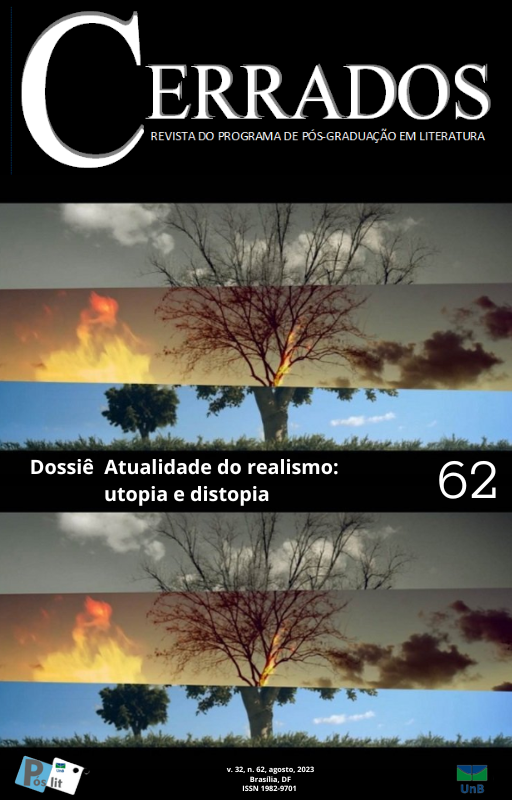De la imagen desiderativa del futuro a la pesadilla distópica del presente, del fin y después: sobre máquinas y automatización, espacio y tiempo ayer y hoy
DOI:
https://doi.org/10.26512/cerrados.v32i62.48733Keywords:
distopía, tiempo, espacio, técnica, utopíaAbstract
This paper proposes an analysis of the uses of dystopia in the past and in the present, through a journey. In this journey, we research two time-spatial instances of configuration of the dystopian: firstly, at the beginning of the 20th century, in the area of the so-called German and Austro-Hungarian fin-de-Siécle. In this context, we will refer to some works by well-known writers (Meyrink, Kafka) and to the cinema of the time, focusing on a work entitled The Other Side [Die andere Seite] [1908], by Alfred Kubin, in order to present the fundamental features that define the utopian, as a program and as an impulse (travel, the primacy of the spatial, the alternative social or collective order, the problem of the political, the body, time and the individual, etc.), paradoxically represented in the dystopia as "world at reverse". Secondly, we will return to the present to review the ways in which these motifs outlined in literature and cinema not only maintain continuity but have become more acute in connection with the development of "capitalist realism" of our time (FISHER , 2021). To do this, we will focus specifically on the dystopian linked to the areas of the city, technology and automation (as forms of alienation) and the problem of time, through various images that represent these topics. The dialogue between the analysis of the works and the images of dystopian representation in the past and in the present, proposes not only a reflection on dystopia, but, above all, to rescue utopia for the present.
Downloads
References
BAUDRILLARD, J., America. Trad. al inglés de C. Turner. Nueva York/Londres: New Left Books/Verso, 1996.
BENJAMIN, W., Obras IV, vol. 1. Trad. de J. Navarro Pérez. Madrid: Abada, 2010.
BLOCH, E., El principio esperanza [1]. Trad. de F. González Vicén. Madrid: Trotta, 2007.
CERRUTI, P., “La distopía como utopía realizada: la persistencia de la esperanza en el mundo poshistórico”. En: Nombres. Revista de filosofía n° 31 (junio de 2018), pp. 237–253.
DELEUZE, G. y GUATTARI, F., Kafka, por una literatura menor. Trad. de J. Aguilar Mora. México: Ediciones Era, 1998.
FISHER, M., K-Punk- Volumen 1. Escritos reunidos e inéditos (Música y política). Trad. de F. Bruno. Buenos Aires: Caja negra, 2022a.
FISHER, M., K-Punk- Volumen 2. Escritos reunidos e inéditos (Libros, películas y televisión). Trad. de F. Bruno. Buenos Aires: Caja negra, 2022b.
FISHER, M., Los fantasmas de mi vida: escritos sobre depresión, hauntología y futuros perdidos. Trad. de F. Bruno. Ciudad Autónoma de Buenos Aires: Caja Negra, 2018.
FISHER, M., Realismo capitalista. ¿No hay alternativa? Trad. de C. Iglesias. Buenos Aires: Caja negra, 2021.
HEINE, H., Noches florentinas. Memorias del señor de Schnabelewopski. Trad. de Revista de Occidente. Navarra: Salvat, 1970.
JAMESON, F., “The End of Temporality”, Critical Inquiry, vol. 29, n° 4 (verano 2003), pp. 695-718.
JAMESON, F. [2005]. Arqueologías del futuro. El deseo llamado utopía y otras aproximaciones de ciencia ficción. Trad. de C. Piña Aldao. Madrid: Akal, 2009.
JAMESON, F., Documentos de cultura, documentos de barbarie. La narrativa como acto simbólico. Trad. de T. Segovia. Madrid: Nueva Visión, 1989.
JAMESON, F., Ensayos sobre el Posmodernismo. Trad. de E. Pérez et al. Buenos Aires: Imago Mundi, 1991.
JAMESON, F., Las antinomias del realismo [2013]. Trad. de J. Madariaga. Madrid: Akal, 2018.
JAMESON, F., Posmodernismo. La lógica cultural del capitalismo avanzado, vol. III. Buenos Aires: La Marca, 2012.
KAFKA, F., El desaparecido (América). Int., trad. y notas de M. Vedda. Buenos Aires: Gorla, 2017.
KRACAUER, S., De Caligari a Hitler. Una historia psicológica del cine alemán. Trad. de H. Grossi. Barcelona: Paidós, 1995.
KUBIN, A., La otra parte. Una novela fantástica. Trad. de J. J. del Solar. Madrid: Minotauro, 2003.
MAGRIS, C., El mito habsbúrgico en la literatura austríaca moderna. Trad. de G. Fernández. México: UNAM, 1998.
MEYRINK, G., “Los cuatro hermanos de la luna. Un documento”. En: El cardenal Napellus. Trad. de M. E. Vázquez. Buenos Aires: Eds. Librería La ciudad, 1979.
PIGLIA, R. “Ricardo Piglia: la utopía defensiva” (entrevista de N. Cabral a R.Piglia, 2010, republicada en 2017). Disponible en: https://www.latempestad.mx/la-utopia-defensiva/ [Consulta: 16/05/2023].
SÁNCHEZ USANOS, D. “Modo supervivencia: sobre la despolitización del imaginario contemporáneo (utopía y distopía)”, en: Quaderns de filosofía, vol VII, n° 2 (2020), pp. 37-57.
THOMSON, P. y ŽIŽEK, S. (eds.), The Privatization of Hope. Ernst Bloch and the Future of Utopía. Durham y Londres: Duke University Press, 2013.
ŽIŽEK, S., Primero como tragedia, después como farsa. Madrid: Akal, 2009.
Downloads
Published
How to Cite
Issue
Section
License
Copyright (c) 2023 Revista Cerrados

This work is licensed under a Creative Commons Attribution 4.0 International License.
Proibida a reprodução parcial ou integral desta obra, por qualquer meio eletrônico, mecânico, inclusive por processo xerográfico, sem permissão expressa do editor (Lei n. 9.610 de 19/2/1998 )



